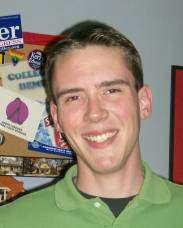My blog has moved!!! Please visit my new blog for all the newest news, events, opinions and more!!!
You will be automatically re-directed in three seconds. Click the link to go to the new blog now. Use the search function on the new blog to find any story you are looking for on here.From the Raleigh News & Observer
http://www.newsobserver.com/lifestyles/story/2814671p-9260714c.html
By KAREN GUZMAN, Staff Writer
When Britton Allen came out at Enloe High School in 1996, he confided his secret to only a few close friends. But they told some other friends, who in turn told others, and so on.
Allen, then 15, ended up being more "out" than he had anticipated, and he faced the repercussions largely alone.
"I was never attacked or anything, though I know people who were," he says. "But certain people were my friends and then didn't want to talk to me."
He teetered in limbo for a while, and then at 17 came all the way out, living openly as a gay teen.
Today, on National Coming Out Day, Allen is returning to Enloe to speak before the school's gay-straight alliance club.
"The GSA didn't exist when I was there," says Allen, a third-year law student at N.C. Central University.
Now more than 20 years after the first National Coming Out Day helped coalesce the gay community, some members say the aim of the event today is less about revealing personal identity and more about building bridges with the straight community. That challenge is slowly becoming easier, they say.
"The more heterosexual people that know someone who's homosexual, the more allies and friends we have, the better off we'll be," Allen says. "I've seen that work in my life."
Coming out can be a difficult journey because some segments of society oppose the "normalization" of homosexuality. Earlier this year in the Triangle, some local religious groups and student organizations countered a day dedicated to highlight discrimination against gays with an effort aimed at expressing that view.
Still, those interested in improving relations between gay and straight people have made progress. In 1997, there were about 100 gay-straight alliances in U.S. high schools. Today, there are nearly 3,000, according to the Gay Lesbian Straight Education Network, which registers clubs.
It's a far cry from the day Melissa Weiss, 35, of Chapel Hill, came out when she was a 20-year-old college student in Ohio.
"I was having a very hard time finding people to talk to about it," says Weiss, executive director of Safe Schools North Carolina, an initiative that addresses gay issues in K-12 schools across the state. "There's more visibility than there's ever been and more organizations."
In the Triangle, more than 20 schools have gay-straight alliances, Weiss says, and local colleges and universities have a variety of other organizations aimed at supporting gay students.
Tom Driscoll, 16, a student at Wake Forest-Rolesville High School, came out last winter. He says it hasn't cost him too many friends.
"It was a lot easier than I thought it was going to be," Driscoll says of being open about his sexuality. "It's much more socially acceptable than it was even five years ago."
That's not to say he has gone unscathed. Driscoll says a number of classmates made "vulgar comments" and one confronted him threateningly.
His experience shows that coming out is an ongoing process, one renewed each time a gay person meets a new person or encounters an experience where sexual identity is divulged.
Launched in the late '80s, National Coming Out Day was born out of the activism surrounding the early years of the AIDS crisis.
Activists started the annual event to coincide with the anniversary of the landmark March on Washington for Lesbian and Gay Rights on Oct. 11, 1987.
The day was originally intended to celebrate coming out, and it helped unify and inspire the gay community across the country.
But this year the focus has shifted to emphasize education and advocacy, says Mark Shields, director of the Human Rights Campaign Foundation's Coming Out Project. This year's theme is "Talk About It."
"We're focused on helping all GLBT (gay, lesbian, bisexual, transgender) and straight people be out and open about their support for equal rights," Shields says.
Still, even within the gay community, there are differences of opinion on when, if and how to come out.
Robin Allen, chair of youth advocacy for the Triangle chapter of PFLAG (Parents, Families and Friends of Lesbians and Gays), stresses there is no single answer for everyone.
"Coming out is such an individual decision that it's not fair for any one person to say that there is a segment of a community that feels one way or another," she says.
"We support people as individuals and families as units. We make no judgement."
Staff writer Karen Guzman can be reached at 829-4752 or kguzman@newsobserver.com.




0 Comments: